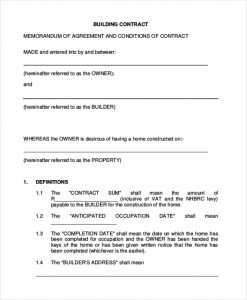House Demolition Agreements are binding contracts that protect both parties involved in a clean-out. A bank or lending agency is usually involved in a home cleanout, as well as the property owner. The homeowner would want to sell their home and the lender would like to take their property back. If you own a house, then you will most likely try to sell it at any price. If you are not, then you have no incentive to enter into a demolition agreement.
House Demolition Agreement – Things You Need to Know
A demolition agreement is essentially a contract which protects both the parties to the transaction. An attorney should be consulted before you sign any agreement. There are many laws that could affect your actions. Also it is wise to consult with your accountant and your real estate agent. These three individuals can help you understand the terms and ensure that there are no hidden fees that could affect your bottom line.
House Demolition Agreement – Things You Need to Know
A house demolition agreement must be in place before any property goes on the market to protect your rights and those of the lender. If a property is not put on the market within a certain period of time the lender may have to assume all of the costs associated with the property, which can cause a financial hardship for the homeowner. Also, if the bank sells the property for less than what is owed on it then they are taking on the house’s mortgage and making themselves richer by doing so.
A demolition agreement should cover all details regarding the property being disposed. This would include the value of the property, the amount needed to pay the mortgage and the exact cost breakdown. This information is crucial as it gives buyers and sellers a complete picture of their property. It allows them to see the options available for selling the house. You can ask them if you want to keep the house, or if you would rather rent it out.
Before drawing up a house demolition agreement there are several things that must be taken into consideration. These include the type of house being demolished, the condition of the property and whether it is worth fixing. Furthermore, the amount of money that has been put down on the property must be spelled out in the contract as well. Last but not least, the contract must clearly state that any unforeseen circumstances are the sole responsibility of the parties.
It is quite simple to get a house demolition agreement. All that is required is for you to have accurate information and to provide accurate statements about what you have and what you will need to move out of the property. In the end, you should have a house demolition agreement that outlines all of the terms and conditions that are to be followed. All of this can be done while taking care of all of the legal matters that can be involved as well.
A House Demolition Agreement, which is a legal document prepared by a property owner or their representative, and a demolition company, usually to prepare the contract. The House Demolition Agreement is a document that is signed under the Local Government Act. It covers local government departments and provides a legal basis for local authorities performing work in accordance to state law. This form is used to plan a demolition on your property or in a pre-planned area. It is important you get the services a qualified solicitor to draft the House Demolition Agreement. They will ensure that it is followed correctly.
There are a few common terms that can all be used in a house demolition contract. The most common terms are listed below. The Site Description is a detailed description about the site for the proposed work. It also includes any possible obstacles to the work, the date of completion and where equipment will be located. The Contract Schedules list the activities and the times they will take place over the contracted period. Site Planners will draw up the layout for the demolition. All relevant documentation such notices, permits, labels, etc. will be included in the contract. An Addendum to the contract details all changes made since the original agreement.
There are two types: an exclusive and open-ended contract. An open-ended agreement is one that remains in place throughout the term of demolition work, but can be modified to accept additional work at set intervals. An exclusive contract is one that is signed for a specific time and contains clauses that are specific to the project. These can be used for short-term work such as painting a room or an area, or replacing windows or fencing.

